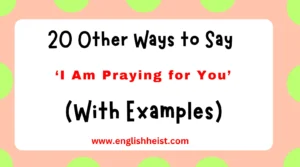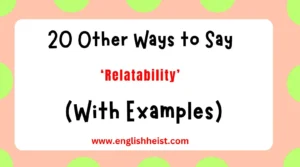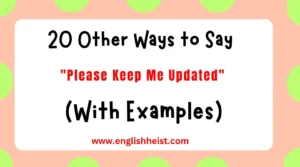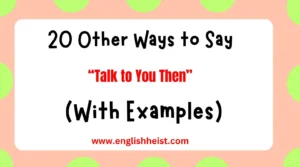Finding the right words to express care and warmth can truly strengthen your relationships. Whether you’re sending a message to a friend, family member, or colleague, it’s important to choose words that convey your feelings thoughtfully. While “thinking of you” is a common phrase, there are countless other ways to show someone you’re keeping them in your thoughts. These alternatives can help you express your care more personally and meaningfully, making your message feel unique and heartfelt.
What Does “Thinking of You” Mean?
“Thinking of you” is a phrase often used to express affection, concern, or support. It implies that the person you’re addressing is in your thoughts, whether they’re going through something challenging or you’re simply sending good wishes. It’s a heartfelt way to show someone that you care and are emotionally connected to their well-being.
Is It Professional/Polite to Say “Thinking of You”?
In professional settings, using “thinking of you” can be both polite and thoughtful, but context is important. In a formal environment, it’s best to use it sparingly and in appropriate circumstances, like offering condolences or support. However, in a more informal or friendly work environment, saying “thinking of you” can be perfectly acceptable. When unsure, it’s always a good idea to err on the side of professionalism, and consider whether the relationship allows for this personal expression.
Pros and Cons of Saying “Thinking of You”
Pros:
- Warm and caring: A simple, sweet way to show someone you’re thinking of them.
- Universal: Works for both casual and intimate relationships.
- Versatile: Suitable for various situations like offering comfort, sympathy, or just checking in.
Cons:
- Overused: Can sound generic if used too often.
- Lack of specificity: Doesn’t always convey the depth of the sentiment.
- Could be misinterpreted: In some contexts, it may seem too casual or unprofessional.
Key Points to Remember:
- The phrase “thinking of you” is warm but can sometimes feel too casual or overused.
- It’s important to know when and how to personalize your message, which is why having alternatives can be helpful.
- Always tailor your tone based on the relationship you have with the person you’re addressing.
Synonyms For Thinking of You
- You’re in My Thoughts
- I’ve Been Thinking About You
- You’re on My Mind
- I’m Keeping You in My Thoughts
- Sending You Positive Vibes
- You’re in My Heart
- You’re Always on My Mind
- I’m Thinking of You Today
- I Hope You’re Doing Well
- I’m Here for You
- Just Wanted to Check In
- Hoping All Is Well
- I’m Sending My Best to You
- I’ve Been Keeping You in My Prayers
- I’m Thinking Good Thoughts for You
- I Just Wanted to Say Hello
- You Crossed My Mind Today
- I’m Always Here If You Need Me
- I’m Sending Warm Wishes Your Way
- Just Reaching Out to Let You Know I Care
1. “You’re in My Thoughts”
Scenario: Someone is going through a tough time or facing a challenge.
Examples:
- “I just wanted you to know, you’re in my thoughts today.”
- “During this difficult time, you’re in my thoughts.”
- “Sending all my love your way—you’re in my thoughts.”
Best Use: When offering support, condolences, or just to show you care.
Tone: Gentle, empathetic.
Explanation: This phrase is a warm, heartfelt way of saying you’re thinking about someone in their time of need.
2. “I’ve Been Thinking About You”
Scenario: You’re reconnecting with someone or expressing care after some time.
Examples:
- “I’ve been thinking about you lately, hope all is well.”
- “I’ve been thinking about you and how much you’ve meant to me.”
- “I’ve been thinking about you and I wanted to check in.”
Best Use: When you’re catching up with someone or offering support after a period of time.
Tone: Thoughtful, considerate.
Explanation: This conveys that you haven’t forgotten about someone, and you care enough to check in.
3. “You’re on My Mind”
Scenario: Expressing care or concern, especially when someone is dealing with something difficult.
Examples:
- “I wanted you to know, you’re on my mind today.”
- “I’ve been thinking of you, you’re on my mind constantly.”
- “You’re on my mind—I hope everything is okay.”
Best Use: Suitable for any situation where you want to show someone that they are in your thoughts.
Tone: Caring, sincere.
Explanation: This phrase shows someone that they are not far from your thoughts and that you care deeply about them.
4. “I’m Keeping You in My Thoughts”
Scenario: Sending condolences or offering support.
Examples:
- “I’m keeping you in my thoughts through this tough time.”
- “Sending my deepest sympathies—keeping you in my thoughts.”
- “You’ve been on my mind, and I’m keeping you in my thoughts.”
Best Use: When sending condolences or offering emotional support.
Tone: Respectful, compassionate.
Explanation: This phrase communicates support and care, especially in times of sorrow or hardship.
5. “Sending You Positive Vibes”
Scenario: Offering encouragement or a burst of energy to someone feeling down.
Examples:
- “Sending you positive vibes and hoping for brighter days ahead!”
- “I know you’ve been facing challenges, so send you positive vibes.”
- “Sending all the positive vibes your way—keep going!”
Best Use: When offering encouragement and hoping for someone’s success or well-being.
Tone: Uplifting, encouraging.
Explanation: This phrase adds a positive spin, focusing on sending good energy and well wishes.
6. “You’re in My Heart”
Scenario: When you want to express deeper affection or empathy, especially during tough times.
Examples:
- “I just wanted to remind you that you’re in my heart.”
- “Even though we’re far apart, you’re always in my heart.”
- “No matter what happens, you’ll always be in my heart.”
Best Use: Suitable for close friends, family, or loved ones.
Tone: Deeply affectionate, empathetic.
Explanation: This expresses a deeper, more intimate level of care, conveying that someone holds a special place in your life.
7. “You’re Always on My Mind”
Scenario: When you miss someone or feel deeply connected to them.
Examples:
- “You’re always on my mind—hope everything is going well for you.”
- “No matter where life takes us, you’re always on my mind.”
- “I just wanted you to know, you’re always on my mind.”
Best Use: For someone you care about deeply, whether in a romantic or platonic relationship.
Tone: Sentimental, affectionate.
Explanation: This phrase expresses a strong emotional connection and shows that someone is never far from your thoughts.
8. “I’m Thinking of You Today”
Scenario: A simple check-in to show you care.
Examples:
- “I’m thinking of you today—hope everything’s going well!”
- “I’m thinking of you today and hoping you’re feeling better.”
- “Just wanted to let you know, I’m thinking of you today.”
Best Use: For a casual, friendly check-in.
Tone: Casual, warm.
Explanation: This is a straightforward, friendly phrase that still shows someone you’re thinking of them without being overly formal.
9. “I Hope You’re Doing Well”
Scenario: Checking in with someone after a while, offering well wishes.
Examples:
- “I hope you’re doing well and finding peace in your day.”
- “Just wanted to check in—I hope you’re doing well!”
- “Sending positive thoughts your way, I hope you’re doing well.”
Best Use: When reconnecting or offering support.
Tone: Polite, caring.
Explanation: A polite and thoughtful way of expressing care, often used to offer good wishes or check in with someone.
10. “I’m Here for You”
Scenario: Offering support and comfort during a challenging time.
Examples:
- “I just wanted to remind you that I’m here for you—always.”
- “If you need anything, just know that I’m here for you.”
- “I’m here for you, no matter what you’re going through.”
Best Use: Offering reassurance and emotional support.
Tone: Reassuring, supportive.
Explanation: This phrase emphasizes your availability and willingness to support someone, no matter what they’re facing.
11. “Just Wanted to Check In”
Scenario: When you want to casually reach out and see how someone is doing.
Examples:
- “Hey! Just wanted to check in and see how things are going with you.”
- “It’s been a while—just wanted to check in and say hello!”
- “I was thinking about you today and just wanted to check in.”
Best Use: A friendly, casual way to reconnect with someone.
Tone: Warm, caring, and informal.
Explanation: This phrase works well when you don’t want to be too serious but still want to show you care.
12. “Hoping All Is Well”
Scenario: A polite and professional way to express that you’re thinking of someone.
Examples:
- “Just dropping a quick note—hoping all is well with you!”
- “I saw something that reminded me of you. Hoping all is well!”
- “Hoping all is well with you and your family.”
Best Use: Best for professional settings, acquaintances, or general check-ins.
Tone: Polite, neutral, and respectful.
Explanation: A simple yet thoughtful way to express care without being too personal.
13. “I’m Sending My Best to You”
Scenario: Offering well wishes to someone in need of support.
Examples:
- “You’ve been on my mind, and I’m sending my best to you.”
- “Whatever you’re going through, I’m sending my best to you.”
- “Just a quick message to let you know I’m sending my best your way!”
Best Use: Encouraging and supportive, great for personal and professional use.
Tone: Kind, uplifting, and encouraging.
Explanation: This phrase keeps things light yet meaningful, showing support without being intrusive.
14. “I’ve Been Keeping You in My Prayers”
Scenario: Offering spiritual or faith-based support.
Examples:
- “I just wanted you to know, I’ve been keeping you in my prayers.”
- “You’re in my thoughts and prayers during this time.”
- “Every day, I say a little prayer for you.”
Best Use: When the recipient appreciates spiritual support.
Tone: Comforting, faith-based.
Explanation: This phrase is great when you want to offer someone encouragement from a spiritual perspective.
15. “I’m Thinking Good Thoughts for You”
Scenario: When someone needs a little extra encouragement.
Examples:
- “I’m thinking good thoughts for you today!”
- “Whenever I think of you, I send good thoughts your way.”
- “Just a reminder—I’m thinking good thoughts for you and hoping for the best.”
Best Use: Encouraging someone facing challenges or important events.
Tone: Positive, hopeful.
Explanation: This phrase works when you want to send optimism and positive energy.
16. “I Just Wanted to Say Hello”
Scenario: A friendly way to reach out without a specific reason.
Examples:
- “No special reason—just wanted to say hello and let you know I was thinking about you!”
- “I came across something that reminded me of you and just wanted to say hello.”
- “It’s been too long! Just wanted to say hello and check in.”
Best Use: Best for casual conversations or reconnecting with friends.
Tone: Lighthearted, friendly.
Explanation: A great phrase when you want to reach out in a non-serious way.
17. “You Crossed My Mind Today”
Scenario: When you want to tell someone they were in your thoughts randomly.
Examples:
- “You crossed my mind today, and I had to reach out!”
- “I was doing something and suddenly thought of you—you crossed my mind today!”
- “You crossed my mind today, so I wanted to say hi!”
Best Use: A spontaneous way to let someone know they are on your mind.
Tone: Casual, warm.
Explanation: This phrase feels natural and spontaneous, making the message feel more genuine.
18. “I’m Always Here If You Need Me”
Scenario: Offering ongoing support to someone going through a tough time.
Examples:
- “No matter what, I’m always here if you need me.”
- “You’re never alone—I’m always here if you need me.”
- “If you ever want to talk, I’m always here for you.”
Best Use: When providing emotional support to a friend or loved one.
Tone: Reassuring, dependable.
Explanation: This phrase lets someone know they can count on you anytime.
19. “I’m Sending Warm Wishes Your Way”
Scenario: When you want to send someone positive energy and kindness.
Examples:
- “I’m sending warm wishes your way—hope today is a good one!”
- “Just a quick note to say I’m sending warm wishes your way!”
- “Whatever you’re going through, I’m sending warm wishes and good energy your way.”
Best Use: Works well for birthdays, celebrations, or when someone needs encouragement.
Tone: Kind, cheerful.
Explanation: This phrase is ideal for sending positivity in a heartfelt way.
20. “Just Reaching Out to Let You Know I Care”
Scenario: A sincere way to show someone you value them.
Examples:
- “Just reaching out to let you know I care about you.”
- “I didn’t want the day to go by without reaching out to let you know I care.”
- “Life gets busy, but I wanted to reach out and remind you that I care.”
Best Use: Best when expressing genuine affection and emotional support.
Tone: Sincere, heartfelt.
Explanation: This phrase makes it clear that you care about the person without needing a specific reason to check in.
Conclusion
There are countless ways to show someone that they are on your mind, and each of these alternatives can add warmth and depth to your message. Whether you’re offering comfort, encouragement, or just checking in, the key is to make your words personal and meaningful. The next time you want to express care, try one of these thoughtful alternatives. They’ll surely bring a smile to the person you’re reaching out to and help strengthen your connection.

Mia Rose is your go-to platform for mastering the English language. Through clear, concise lessons and expert advice, Mia makes learning grammar, vocabulary, and writing skills easy and enjoyable. Whether you’re a beginner or looking to refine your skills, English Heist helps you communicate confidently and effectively.













